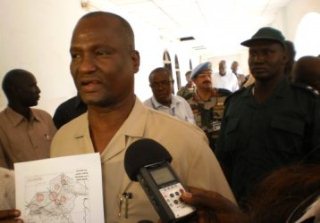SPLM official in Unity state says party traumatised by tribalism and corruption
July 9, 2013 (BENTIU) – The deputy chairman of South Sudan’s ruling party in Unity state said on Tuesday that the top leadership of the Sudan People’s Liberation Movement (SPLM) is traumatised by unrest caused by tribalism and corruption.

Kiir’s deputy, Riek Machar, has written to the president asking him to reinstate Taban Deng Gai, suggesting that the move violated South Sudan’s constitution. Following his surprise ouster on Sunday, Deng has claimed that he was sacked for political reasons.
Joseph Nguen Minytuil has been appointed Unity state’s caretaker governor, after Kiir used his powers under South Sudan’s constitution to remove a state Governor in the event of threats to national security or territorial integrity. Machar’s letter questioned whether this was the case in Unity state pointing out Deng’s role in a rebel movement ending its insurgency against the government.
Should a governor be removed, the constitution stipulates that fresh elections should be organised within 60 days, however this has not happened in Lakes state where a caretaker governor has been in power since January.
In his public address on Tuesday, Geng, a former agricultural minister in Unity state, called on the ousted governor to continue to challenge tribalism in the ruling SPLM.
He described the ex governor as a good leader who had committed himself to the SPLM’s cause. Deng, like most other senior SPLM politicians fought in the two-decade Sudanese civil war that led to South Sudan’s independence on 9 July 2011.
However, since independence critics and more recently some of the SPLM’s most high profile international supporters have bemoaned the state of human rights, press freedom, corruption and tribalism in the world’s youngest nation.
Geng said he was sure that Deng’s removal was undemocratic and was made on the assumption that he would not support president Kiir’s attempts to secure a third term in office from 2015.
After his sacking, Deng told Sudan Tribune that he suspected Kiir removed him on the mistaken belief that he wants to be Riek Machar’s running mate should the vice president, as appears likely, go for the top job in two years time.
Senior members of the SPLM in Unity state have also claimed that this was the reason behind Kiir’s decision.
”We have strong faith [in the] former governor. His going to Juba will reduced the ill-treatment of tribalism among some leaders in South Sudan”, said Geng.
Geng encouraged the former governor to campaign for unity among South Sudan’s many tribal groups, some of which remain suspicious of each other as a hangover from the factional fighting that typified the independence struggle.
Since the SPLM achieved long-sought-after independence for South Sudan, Geng said that the party had lacked “vision”. Recently many SPLM senior officials have blamed the national chairman of the SPLM, Pagan Amum, for failing to effectively manage the party.
On Monday the former governor said the president had been taking bad advice from people who did not fight alongside them in the civil war and warned that if Kiir continued to listen to such as advice his term may come to an end before the 2015 elections.
The feeling on the street in Unity state’s capital Bentiu is that president Kiir – who hails from the Dinka, South Sudan’s largest ethnic group – is targeting senior politicians from the Nuer tribe, the second largest group.
Both Machar and Deng are members of the Nuer ethnic group. The other governor to be sacked by Kiir this year, Chol Tong Mayay of Lakes state, is, like Kiir, a Dinka.
The Nuer are the majority tribe in Upper Nile and Unity state which produce most of South Sudan’s oil. Many South Sudanese are concerned that not enough is being done to retrieve the estimated $4 billion in oil revenues that has gone missing since the SPLM came to power.
In 2012 Kiir wrote to 75 government officials asking them to return the funds and he used his speech on South Sudan’s second commemoration of independence on Tuesday to reiterate that his government will no longer tolerate corruption and vowed to persecute people involved in such crimes.
Two senior ministers were recently suspended while they are investigated over a large government acquisition that was not approved by the relevant ministries or the president.
A senior official in the Unity state government told Sudan Tribune on Tuesday that main reason the president had so far failed to arrest those suspected of large-scale corruption was because the majority are alleged to be from Kiir’s homes state of Warrap.
(ST)
- ST – Cracks in South Sudan presidency over dismissal of Unity state governor
- ST – Kiir says era of impunity on corruption crimes is over
- ST – My sacking was unconstitutional, says former Unity State governor
- ST – South Sudan’s Kiir relieves Unity state governor Taban Deng
- ST – ‘Friends of South Sudan’ go public with call for “significant changes and reform” in Juba
